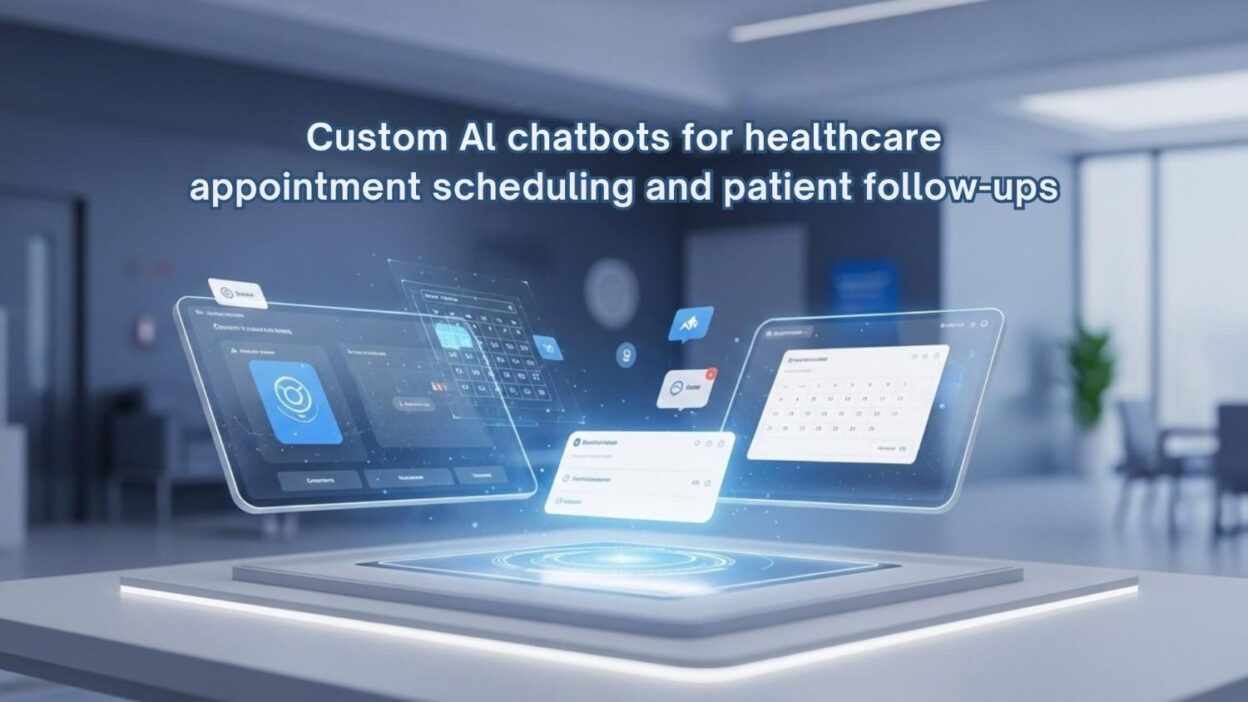Introduction
TL;DR Healthcare providers struggle with administrative burdens that pull staff away from patient care. Phone lines stay jammed with appointment requests throughout business hours. Patients wait on hold for 10-15 minutes just to schedule routine visits. Front desk staff spend entire days managing calendars instead of greeting patients warmly.
Appointment no-shows cost medical practices thousands of dollars monthly in lost revenue. Patients forget their scheduled visits without adequate reminders. Manual reminder calls consume staff time that could serve patients better. Follow-up care instructions get forgotten after patients leave your office.
Custom AI chatbots healthcare appointment scheduling revolutionizes how medical practices operate daily. Intelligent virtual assistants handle appointment bookings 24/7 without human intervention. Patients schedule visits at midnight from their smartphones conveniently. Automated reminders reduce no-show rates by 30-40% consistently. Your staff finally focuses on in-person patient care instead of phones.
Traditional appointment systems frustrate both patients and healthcare providers equally. Voicemail systems force patients through endless menu options. Busy signals drive patients toward competitor practices accepting calls. After-hours emergencies have nowhere to turn for basic scheduling. Patient satisfaction suffers from accessibility limitations.
Modern chatbot technology eliminates these friction points completely. Natural language processing understands patient requests in plain English. Integration with electronic health records maintains information accuracy. HIPAA-compliant systems protect sensitive medical information properly. Implementation takes weeks rather than months for most practices.
This comprehensive guide explores how custom AI chatbots healthcare appointment scheduling transforms medical practice operations. You’ll discover specific platforms designed for healthcare environments. You’ll learn implementation strategies protecting patient privacy while improving access. Your practice will deliver better patient experiences while reducing administrative costs.
Table of Contents
Understanding the Healthcare Scheduling Challenge
Medical appointment scheduling creates unique challenges other industries don’t face. Recognizing these specific problems helps you select appropriate chatbot solutions.
Phone-based scheduling creates terrible patient experiences consistently. Patients call during work hours when they’re busy themselves. Hold times exceed acceptable limits during peak morning hours. Staff shortages mean phones go unanswered frequently. Missed calls represent missed revenue opportunities directly.
Provider schedule complexity overwhelms manual coordination efforts. Different appointment types require varying time blocks. Multiple providers share examination rooms creating conflicts. Lab work and imaging need coordination with physician visits. Complexity grows exponentially in larger practices.
Insurance verification delays appointment confirmation unnecessarily. Staff must verify coverage before scheduling certain procedures. Manual verification takes 5-10 minutes per patient. Patients wait days for confirmation on urgent matters. This delay frustrates patients and slows practice operations.
No-show rates devastate practice revenue and efficiency. Empty appointment slots represent unrecoverable lost income. Other patients who needed those times couldn’t access care. Provider schedules contain gaps reducing productivity. No-shows cost the healthcare industry $150 billion annually.
Follow-up appointment scheduling gets forgotten during busy visits. Patients intend to call back later but forget completely. Chronic condition management requires consistent follow-ups. Gaps in care lead to preventable health complications. Continuity of care suffers from follow-up failures.
After-hours access problems drive patients to emergency rooms. Minor issues escalate without access to basic information. Emergency departments get overwhelmed with non-emergencies. Healthcare costs skyrocket through inappropriate care settings. Patient outcomes suffer from delayed appropriate care.
Multi-location practices face coordination nightmares. Patients want appointments at convenient locations. Different sites have different specialties and availability. Manual coordination across locations proves extremely difficult. Patients choose competitors offering simpler scheduling experiences.
How AI Chatbots Specifically Address Healthcare Scheduling
Custom AI chatbots healthcare appointment scheduling solutions target each pain point systematically. Modern technology redesigns patient access around convenience and efficiency.
Natural language understanding interprets patient requests accurately. Patients type or speak in plain everyday language. The chatbot understands intent without requiring specific phrases. Appointment requests get processed regardless of how patients ask. This natural interaction feels comfortable for all ages.
24/7 availability serves patients around their schedules. Working parents book appointments after children sleep. Night shift workers schedule during their daytime. International patients book from different time zones easily. Access barriers disappear when scheduling never closes.
Real-time calendar integration shows actual provider availability. The chatbot connects directly to practice management systems. Available slots appear instantly without staff intervention. Double-booking becomes impossible through system integration. Schedule accuracy improves dramatically through automation.
Multi-step verification happens within the conversation flow. Insurance information gets confirmed before finalizing appointments. Medical history updates occur during booking process. Pre-visit paperwork gets completed digitally ahead of time. This preparation accelerates in-office check-in substantially.
Intelligent appointment matching considers multiple factors simultaneously. Patient location preferences get honored automatically. Provider specialties match patient needs appropriately. Appointment urgency determines how soon slots get offered. Complex logic executes instantly through algorithms.
Automated reminder systems reduce no-shows dramatically. Text message reminders send 48 hours before appointments. Second reminders go out 24 hours prior. Patients confirm or reschedule through simple responses. This two-way communication maintains schedule integrity.
Follow-up scheduling happens before patients leave digitally. Chatbots send follow-up scheduling prompts at appropriate intervals. Patients book return visits from home conveniently. Chronic disease management protocols trigger automatic outreach. Continuity of care improves through systematic follow-up.
HIPAA Compliance and Healthcare Data Security
Medical information security requires absolute priority in healthcare chatbots. Patient privacy laws carry severe penalties for violations. Proper implementation protects both patients and providers.
HIPAA compliance forms the foundation of healthcare chatbots. Systems must encrypt data in transit and at rest. Access controls limit who sees patient information. Audit logs track every data access event. Compliance isn’t optional in healthcare environments.
Business Associate Agreements establish vendor accountability. Chatbot vendors must sign BAAs accepting HIPAA obligations. These legal agreements allocate liability appropriately. Never deploy healthcare chatbots without proper BAAs. Legal protection requires documented agreements.
Data minimization principles limit exposure risks. Chatbots collect only necessary medical information. Excessive data collection increases breach liability. Smart systems infer needs without requiring full histories. Minimal data collection protects patient privacy better.
Secure authentication verifies patient identities properly. Multi-factor authentication prevents unauthorized access. Birthdate and medical record numbers confirm identity. Account takeover prevention protects patient information. Strong authentication balances security with convenience.
Encryption standards protect data throughout transmission. TLS 1.3 or higher encrypts all communications. End-to-end encryption prevents interception. Even chatbot vendors cannot read patient conversations. Military-grade encryption standards apply to healthcare.
Regular security audits identify vulnerabilities proactively. Penetration testing reveals potential weaknesses. Third-party assessments provide objective security evaluations. Annual audits demonstrate ongoing compliance commitment. Proactive security prevents costly breaches.
Incident response plans prepare for potential breaches. Clear procedures define notification requirements. Patient communication templates stand ready. Regulatory reporting obligations get met promptly. Preparation minimizes damage when incidents occur.
Essential Features for Healthcare Appointment Chatbots
Effective healthcare chatbots require specific capabilities beyond basic scheduling. Custom AI chatbots healthcare appointment scheduling includes these critical features for medical environments.
Appointment type selection guides patients appropriately. New patient visits require longer time blocks. Follow-up appointments need different durations. Procedure appointments involve special preparations. Intelligent routing matches needs with proper slots.
Provider preference accommodation improves patient satisfaction. Established patients often prefer specific doctors. Gender preferences matter for certain specialties. Language capabilities influence provider selection. The chatbot honors these preferences when possible.
Insurance verification integration streamlines the process. Real-time eligibility checks confirm coverage instantly. Out-of-network warnings prevent surprise bills. Referral requirements get identified automatically. Financial clarity improves patient experience substantially.
Waiting list management fills cancellation slots automatically. Patients opt into waiting lists for sooner appointments. Cancellations trigger automatic notifications to waitlisted patients. First responders claim newly available slots. This optimization maximizes provider schedule utilization.
Multi-location support serves distributed practices. Patients see all locations with availability. Distance calculations show nearest convenient options. Location-specific information appears automatically. Geographic distribution gets optimized intelligently.
Telemedicine integration offers virtual visit options. Appropriate conditions get flagged for telehealth. Virtual appointment slots appear alongside in-person options. Video visit instructions provide automatically. This flexibility increases access dramatically.
Prescription refill coordination reduces phone calls. Patients request refills through the chatbot. Messages route to pharmacy staff appropriately. Refill readiness notifications send automatically. Simple tasks automate completely.
Symptom checking guides appropriate care levels. Basic triage questions assess urgency. Emergency situations get directed to 911 immediately. Urgent care needs route appropriately. This guidance improves care quality and reduces inappropriate ER visits.
Patient Follow-Up Automation Through AI Chatbots
Appointment scheduling represents just the beginning of chatbot value. Post-visit follow-up automation improves outcomes and patient satisfaction dramatically.
Post-discharge check-ins ensure recovery progresses properly. Chatbots message patients 24-48 hours after procedures. Simple questions assess pain levels and complications. Red flag symptoms trigger immediate nurse contact. This monitoring catches problems before they escalate.
Medication adherence reminders improve treatment compliance. Patients receive reminders about prescription schedules. Refill alerts prevent running out of medications. Side effect monitoring happens through chatbot conversations. Compliance improves when patients get consistent support.
Lab result notifications deliver information promptly. Patients receive alerts when results become available. Normal results get communicated through the chatbot. Abnormal findings trigger provider appointment scheduling. Timely communication reduces patient anxiety significantly.
Chronic disease management protocols execute automatically. Diabetic patients receive regular A1C testing reminders. Hypertension patients get prompted about blood pressure monitoring. Condition-specific education delivers at appropriate intervals. Systematic outreach improves long-term health outcomes.
Preventive care reminders maintain health proactively. Annual physical reminders send when appointments come due. Vaccination schedules trigger appropriate notifications. Cancer screening reminders align with medical guidelines. Preventive care compliance improves through systematic outreach.
Survey collection gathers patient feedback automatically. Post-visit satisfaction surveys send after appointments. Specific questions assess different service aspects. Negative feedback alerts management immediately. This real-time feedback enables rapid service improvements.
Patient education delivery happens at teachable moments. Post-diagnosis education materials share automatically. Procedure preparation instructions arrive at optimal times. Recovery guidance delivers when patients need it most. Timely education improves understanding and outcomes.
Care gap identification closes quality measure gaps. Electronic health record integration reveals missing preventive services. Outreach campaigns target specific populations systematically. Quality measures improve through automated gap closure. Value-based care reimbursements increase accordingly.
Leading Healthcare Chatbot Platforms and Solutions
Several specialized platforms serve healthcare appointment scheduling specifically. Custom AI chatbots healthcare appointment scheduling requires selecting appropriate technology partners.
Qure.ai provides HIPAA-compliant conversational AI for healthcare. The platform handles appointment scheduling with EHR integration. Symptom checking capabilities triage patients appropriately. Multi-language support serves diverse patient populations. Pricing requires consultation based on practice size.
Orbita specializes in healthcare conversational AI solutions. The platform supports both voice and text interactions. Integration with major EHR systems works seamlessly. Custom workflow creation matches practice-specific needs. Enterprise-focused with pricing reflecting comprehensive capabilities.
Hyro offers healthcare-specific natural language understanding. The system connects with existing scheduling systems. Adaptive conversations feel natural to patients. Analytics dashboards show usage patterns and optimization opportunities. Pricing scales with practice size and complexity.
Memora Health focuses on post-discharge patient engagement. Text-based chatbot delivers care plans and reminders. Bidirectional communication enables patient questions. Nurse escalation happens for concerning responses. Strong focus on follow-up care automation.
Notable Health emphasizes intelligent scheduling optimization. AI predicts no-show likelihood for strategic overbooking. Waitlist management fills cancelled appointment slots. Schedule optimization increases provider productivity measurably. Analytics prove ROI through improved utilization.
Aiva provides multilingual patient engagement solutions. Over 100 languages serve diverse communities. Cultural considerations inform conversation design. Phone, text, and web channels reach all patients. Accessibility focus serves underserved populations.
Luma Health offers comprehensive patient engagement platform. Appointment scheduling combines with automated reminders. Waitlist management and recall campaigns maximize schedules. Two-way texting enables flexible patient communication. Integrated approach serves all scheduling needs.
Clearstep specializes in digital front door experiences. Symptom assessment guides patients to appropriate care. Schedule integration books appointments automatically. Care navigation reduces unnecessary ER visits. Smart triage improves both experience and outcomes.
Implementing Chatbots in Your Healthcare Practice
Successful deployment requires careful planning and execution. Follow these strategic steps for effective implementation results.
Assess your current scheduling process comprehensively. Document every step from patient call to appointment completion. Identify specific pain points causing problems. Measure baseline metrics for later comparison. This assessment guides chatbot configuration appropriately.
Define clear objectives and success metrics. Determine which problems you want to solve first. Establish measurable goals for improvement. Identify KPIs tracking progress toward goals. Clear objectives guide platform selection and configuration.
Select platforms with healthcare-specific capabilities. Generic chatbots lack necessary compliance and features. Healthcare-focused vendors understand industry requirements. Verify HIPAA compliance credentials thoroughly. Check references from similar-sized medical practices.
Plan EHR and practice management integration. Seamless integration determines functional effectiveness. Work with IT teams early in planning. Allocate sufficient time for integration testing. Integration quality determines overall success significantly.
Design conversation flows matching patient needs. Map common patient requests and questions. Create natural conversation paths for each scenario. Include error handling for unusual requests. Patient-centered design improves adoption rates.
Pilot with limited appointment types initially. Start with routine follow-up appointments. Expand to new patient scheduling after validation. Add complex appointments once confidence builds. Gradual rollout manages risk effectively.
Train staff on chatbot capabilities and limitations. Receptionists need to understand when chatbot handles requests. Providers should know what automation exists. Patient service teams require troubleshooting knowledge. Staff confidence enables successful patient adoption.
Promote chatbot availability to patients actively. Website placement drives initial adoption. Patient portal messages introduce the capability. In-office signage educates waiting patients. Active promotion accelerates utilization growth.
Measuring Success and Optimizing Performance
Tracking specific metrics proves chatbot value and guides improvements. Custom AI chatbots healthcare appointment scheduling delivers measurable benefits when monitored properly.
Appointment booking volume tracks adoption rates. Count total appointments scheduled through chatbot. Compare against phone-based scheduling volumes. Growth trends show increasing patient preference. Volume metrics prove utilization success.
Average handling time measures efficiency gains. Calculate time from initial patient contact to confirmed appointment. Compare chatbot speed against phone-based scheduling. Time savings multiply across hundreds of appointments monthly. Efficiency gains translate directly to cost savings.
No-show rate reduction demonstrates outcome improvements. Track appointment no-shows before and after chatbot implementation. Automated reminders reduce no-shows by 30-40% typically. Calculate revenue recovered through better attendance. This single metric often justifies entire investment.
Patient satisfaction scores reveal experience quality. Survey patients about scheduling experience satisfaction. Compare chatbot users against traditional schedulers. Net Promoter Score measures loyalty and referral likelihood. Experience quality determines long-term adoption success.
Staff time reallocation measures operational impact. Calculate hours previously spent on appointment scheduling. Document how reclaimed time gets redirected. Patient care time increases when scheduling automates. Operational efficiency improves measurably.
After-hours booking percentage shows access improvements. Track appointments scheduled outside business hours. This metric demonstrates expanded access value. Working patients especially appreciate evening scheduling capabilities. Access expansion serves previously underserved populations.
Conversation completion rate indicates user experience quality. Measure percentage of chatbot conversations reaching successful appointments. Low completion rates indicate conversation design problems. High completion proves intuitive user experience. This metric guides conversation flow optimization.
Cost per appointment calculation proves financial value. Include chatbot subscription and implementation costs. Divide by total appointments scheduled through system. Compare against fully-loaded staff scheduling costs. Financial metrics convince CFOs and administrators.
Overcoming Common Healthcare Chatbot Challenges
Every implementation faces predictable obstacles. Preparation and awareness enable effective problem-solving approaches.
Patient technology adoption varies by demographics. Older patients sometimes resist new technologies. Rural populations may lack smartphone access. Digital literacy varies widely across populations. Multi-channel access including phone ensures universal availability.
Complex medical terminology confuses chatbots sometimes. Natural language understanding continues improving. Medical jargon requires special training. Acronyms and specialty terms need explicit programming. Ongoing training improves accuracy over time.
Insurance verification complexity challenges automation. Coverage rules vary widely across payers. Real-time eligibility checks sometimes fail. Manual fallback procedures need to exist. Hybrid approaches combine automation with human backup.
Provider schedule preferences require accommodation. Some physicians prefer specific appointment patterns. Block scheduling for certain activities. Emergency slots need to remain available. Configuration must respect individual provider needs.
Emergency situation handling requires careful design. Chatbots must recognize urgent and emergency scenarios. Appropriate escalation to humans happens immediately. Liability concerns demand conservative triage. Clear disclaimers manage expectations appropriately.
Multi-specialty coordination introduces complexity. Different specialties require different information. Referral workflows need special handling. Specialist availability may be limited. Coordination logic requires sophisticated programming.
Language barriers affect diverse populations. Translation accuracy matters enormously in healthcare. Cultural considerations influence conversation design. Medical translation requires specialized expertise. Professional medical interpretation remains necessary sometimes.
Vendor dependency creates long-term concerns. Switching costs can be substantial. Data portability requirements should be clear. Open standards provide more flexibility. Evaluate vendor stability and industry commitment.
Future Trends in Healthcare AI Chatbots
Healthcare chatbot technology evolves rapidly. Understanding trends helps you prepare for emerging capabilities.
Voice-first interfaces enable hands-free scheduling. Smart speakers in homes accept appointment bookings. Voice recognition accuracy improves continuously. Elderly patients benefit from voice interaction. Conversational interfaces become increasingly natural.
Predictive scheduling anticipates patient needs proactively. AI analyzes health data predicting needed appointments. Chronic disease management schedules appointments automatically. Preventive care outreach happens at optimal times. Proactive care replaces reactive appointment booking.
Emotional intelligence improves patient interactions. Sentiment analysis detects patient frustration or anxiety. Conversation tone adjusts based on emotional state. Empathy in chatbot responses improves experience. Emotional awareness creates more human-like interactions.
Visual symptom assessment enhances triage accuracy. Patients upload photos of concerning symptoms. Computer vision analyzes images for concerning features. Dermatology and wound care benefit especially. Visual analysis augments text-based conversations.
Personalization deepens through machine learning. Chatbots remember patient preferences and history. Conversation style adapts to individual communication preferences. Recommendations become increasingly relevant over time. Personalization improves satisfaction and outcomes.
Interoperability standards enable cross-system communication. FHIR and HL7 standards facilitate data exchange. Patients switch providers without losing chatbot relationship. Healthcare information exchanges connect disparate systems. Seamless data flow improves care coordination.
Ambient documentation captures visit information automatically. Voice recognition transcribes provider-patient conversations. AI extracts relevant information for medical records. Documentation burden decreases for physicians. More provider time focuses on direct patient care.
Blockchain technology secures patient data sharing. Patients control who accesses their information. Immutable logs prove data access history. Trust increases through transparent security. Decentralized systems prevent single-point failures.
Frequently Asked Questions About Healthcare Appointment Chatbots
Are AI chatbots HIPAA compliant for medical practices?
Yes, specialized healthcare chatbots comply fully with HIPAA requirements. Vendors must sign Business Associate Agreements accepting liability. Encryption protects data in transit and storage. Audit trails document all information access. Choose vendors with proven healthcare compliance credentials. Generic chatbots lack necessary security features for healthcare.
How much do healthcare appointment scheduling chatbots cost?
Pricing varies widely from $200-2000+ monthly depending on features. Practice size and appointment volume affect costs. Implementation fees range from $2000-10,000 typically. EHR integration complexity influences total costs. Custom AI chatbots healthcare appointment scheduling delivers ROI within 6-12 months usually. Calculate savings from reduced staff time and fewer no-shows.
Will patients actually use chatbots instead of calling?
Yes, adoption rates reach 40-60% within six months typically. Younger patients adopt immediately and enthusiastically. Older populations take longer but ultimately appreciate convenience. After-hours booking drives early adoption significantly. Promotion and education accelerate patient acceptance. Most practices maintain phone options alongside chatbots.
Can chatbots handle complex scheduling needs?
Modern chatbots manage most scheduling complexity effectively. Multi-step appointments coordinate across providers and services. Insurance verification happens within conversation flow. Special requirements get captured and communicated. Very complex cases escalate to human staff. Hybrid approaches handle edge cases appropriately.
How long does chatbot implementation take?
Basic implementations deploy within 4-8 weeks typically. EHR integration extends timeline to 8-12 weeks. Staff training and patient education happen concurrently. Gradual rollout extends overall timeline strategically. Full optimization continues for 3-6 months. Faster than traditional system implementations significantly.
Do chatbots reduce front desk staffing needs?
Chatbots reallocate rather than eliminate staff usually. Receptionists focus on in-person patient service. Complex problem-solving requires human judgment. Staff roles evolve toward higher-value activities. Practices handle growth without proportional staff increases. Labor savings come through efficiency rather than headcount reduction.
What happens when chatbots don’t understand patients?
Graceful degradation transfers to human staff. Patients receive apology and alternative contact method. Confusion logs help improve chatbot training. Hybrid approaches combine AI with human backup. Continuous improvement reduces misunderstanding frequency. Most platforms achieve 90%+ comprehension rates.
Can chatbots send appointment reminders automatically?
Yes, automated reminders form core chatbot functionality. Text, email, and voice reminders reach patients. Timing customizes based on appointment type. Two-way communication enables confirmation responses. Reminders reduce no-shows by 30-40% consistently. This single feature often justifies entire investment.
Read More:-Healthcare Data Processing: Turning Information into Insights
Conclusion

Healthcare providers face crushing administrative burdens limiting patient care focus. Phone-based scheduling frustrates patients while consuming staff time. No-shows waste valuable appointment slots costing thousands monthly. Follow-up care coordination falls through cracks causing preventable complications.
Custom AI chatbots healthcare appointment scheduling transforms these operational challenges completely. Intelligent virtual assistants handle bookings 24/7 without breaks. Natural language understanding interprets patient requests accurately. Integration with electronic health records maintains schedule accuracy. Your practice delivers modern patient experiences matching other industries.
Implementation requires selecting HIPAA-compliant platforms designed specifically for healthcare. Generic chatbots lack necessary security and medical features. Healthcare-focused vendors understand compliance requirements deeply. Business Associate Agreements establish proper legal protections. Security cannot be an afterthought in medical environments.
Essential features include appointment type intelligence and insurance verification. Provider preference accommodation improves patient satisfaction significantly. Multi-location support serves distributed practices effectively. Telemedicine integration expands access options. Symptom checking guides appropriate care levels protecting outcomes.
Patient follow-up automation extends value beyond initial scheduling. Post-discharge monitoring catches complications early. Medication adherence reminders improve treatment compliance. Preventive care outreach maintains health proactively. Care gap closure improves quality measures and outcomes.
Multiple specialized platforms serve healthcare scheduling needs. Qure.ai, Orbita, and Hyro offer comprehensive solutions. Memora Health focuses specifically on post-discharge engagement. Luma Health and Clearstep provide integrated patient engagement. Evaluate platforms based on your specific practice requirements.
Successful implementation follows systematic planning processes. Baseline measurement proves improvement objectively. Clear objectives guide platform selection appropriately. EHR integration quality determines functional success. Staff training ensures smooth patient experiences.
Measured results prove chatbot value convincingly. No-show reductions deliver immediate financial returns. Patient satisfaction improvements build loyalty and referrals. Staff time reallocation enables better patient care. Cost per appointment calculations prove financial efficiency.
Common challenges have proven solutions through experience. Technology adoption varies requiring multi-channel access. Complex terminology needs ongoing training. Emergency handling requires conservative approaches. Vendor selection should prioritize healthcare specialization.
Future trends promise even greater capabilities. Voice interfaces enable hands-free interaction. Predictive scheduling anticipates needs proactively. Emotional intelligence improves conversation quality. Visual symptom assessment enhances triage accuracy.
Start your healthcare chatbot journey by assessing current scheduling pain points. Identify specific metrics proving success. Research healthcare-specialized vendors thoroughly. Plan EHR integration with IT teams early. Pilot with limited appointment types building confidence.
Custom AI chatbots healthcare appointment scheduling delivers transformative results for medical practices. Patient access improves dramatically through 24/7 availability. Staff productivity increases through automation. Revenue grows through reduced no-shows and optimized schedules. Patient satisfaction rises from convenient modern experiences.
Take action today to implement intelligent scheduling automation. Your patients deserve convenient appointment access. Your staff deserves liberation from phone call monotony. Your practice deserves operational efficiency enabling growth. Success in modern healthcare requires embracing proven automation technologies.
The technology exists and works reliably across thousands of practices. Your competitors likely already offer chatbot scheduling. Patient expectations continue rising for digital convenience. Delay means losing patients to more accessible competitors. Implementation timelines measure in weeks making immediate action feasible.
Begin your transformation toward intelligent patient engagement now. Chatbot scheduling represents just the beginning of AI benefits. Follow-up automation improves outcomes measurably. Your practice will thrive through operational excellence and superior patient experience. The future of healthcare administration is here today.





